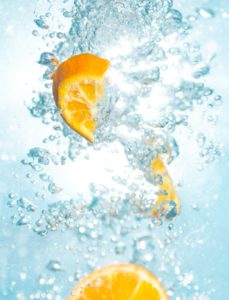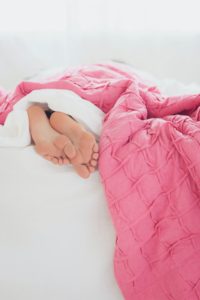You probably know that you need adequate sleep and hydration to stay healthy, right? What you may not realize, is how closely the two are connected.
Did you know, adults who sleep 6 hours or less each night are up to 59% more likely to be dehydrated, compared to those who get a full 8 hours of sleep. That’s according to a recent study by Pennsylvania State University.
Researchers believe one underlying cause is vasopressin. This hormone maintains your water balance and rises during the later stages of sleep. If you miss those hours, your kidneys won’t retain enough fluid.
What’s interesting about this, (for me, at least) is how this relates to Chinese Medical theory. In Chinese medicine, we often note that insomnia and other sleep disorders are caused by patterns involving the Kidney organ system. One common pattern is a disharmony of the Kidney and Heart, where a person may have mental restlessness, poor memory, dizziness, a sore low back, and night sweats in addition to insomnia. Another is Kidney Yin deficiency, where hot flashes, night sweats, nocturia (nighttime urination), tinnitus, and dark-scanty urine (dehydrated much?) are common presentations. *this is all starting to really make sense*
This example of vasopressin is just one example of how fluid intake and sleep affect each other. So how do we get more sleep and stay hydrated? Well, first I have to plug Acupuncture in here because it’s awesome and helps with sleep, kidney function, calming the nervous system, detoxing and hormone balance so HUGE bang for you buck… but in addition, implementing these next habits can really make a difference in your sleep life.
For a more detailed blog post on how Acupuncture can help with sleep and other disorders check out this post from The Mattress Nerd.
Get Yourself Some Good Sleep Habits:
1. Schedule sleep. Going to bed and waking up at the same time each day is one of the most effective ways to increase the quality and quantity of your sleep. You’ll lower your risk for insomnia and dehydration by strengthening your body’s natural rhythms. Once again, another kidney reference here… your natural rhythms are highly influenced by cortisol release. Your cortisol should spike at certain times of the day, the morning being one of those – it’s what gets you up and out of bed and gives you a feeling of alertness. If this cycle gets out of balance, your cortisol release is too high overtime (hello stress) or you’ve stopped producing the correct amounts of cortisol after chronically being in the previous state, your natural cycle is a mess, and here we have another imbalance in the kidney organ system.
2. Practice nasal breathing. The average adult loses about 1 liter of fluid each night. You can dramatically lower that amount by breathing through your nose instead of your mouth. Lying on your back with your head slightly elevated will help. Essential oils can help open the airways, as can, you guessed it, acupuncture.
Practice alternate nostril breathing prior to bed, to prime the airways. Learn the technique and other breathing exercises here.
3. Cool off. A hot bedroom also contributes to moisture loss, so turn your thermostat down. As a bonus, you’ll save on energy and probably fall asleep faster. There are also some pretty cool things on the market that help dial in your sleep temperature from your mattress… check out the Chili Pad.

Hydration Habits:
- Spread out your intake. Aim to drink about an ounce of water for each pound of body weight. It’s easier if you sip throughout the day. Foods like celery, strawberries, and tomatoes count too.
- Drink water first thing. Start the day with a big glass of water. It will help to make up for some of the fluid you lost overnight. Add some lemon juice or some apple cider vinegar and a dash of Himalayan sea salt for extra minerals and hydration.
- Postpone coffee. That glass of water will probably wake you up just as well as your usual cup of coffee, so you can save your latte for later. Excessive caffeine may interfere with your sleep, especially if you continue consuming it after about 2 pm.
- Rehydrate during and after workouts. Water is usually sufficient for replacing the fluids you lose at the gym. There are some great hydration mixes you can get these days to add your loss of electrolytes and minerals back in, I’m not generally a fan of sports drinks as they tend to just have a lot of sugar and not much more. It’s generally just as good to eat your fruits and or more carbs following your workouts – but this is all highly sensitive to the amount of time your exercising, the type of exercise, and where and when you are. One of my favorite electrolyte/salts mix to use these days is LMNT which you can buy here.
- Limit alcohol. It’s the one beverage that actually dehydrates you. Drink responsibly and avoid any cocktails close to bedtime. Plus, it usually disrupts your sleep cycle anyway, gives some people night sweats… see a pattern yet?
- Avoid sugar. Dehydration tends to make you crave sweets, but sugary beverages are more difficult for your body to absorb. Stick to plain or naturally flavored water.
More Tips:
- Treat nocturia. If you make 3 or more trips to the bathroom each night, you may have a condition called nocturia or nighttime urination. Trying to control it by drinking less water can backfire because your urine becomes more concentrated. Remember when I mentioned Kidney Yin deficiency…
- Fight cramps. Stiff muscles are another physical symptom of dehydration that may keep you up at night. In addition to water, try adding a good electrolyte mix, some magnesium into your diet or supplementation, and daily stretching.
- See your doctor or another care provider. Your family physician, acupuncturist, or naturopath can answer your personal questions about hydration, sleep, and other health issues. That may include the implications of any chronic conditions or medications that are concerns for you.
So, there you have it. You’ve got the tools, a little extra knowledge, now go get some sleep and improve your quality of life!
Till next time, sweet dreams~
Erin


